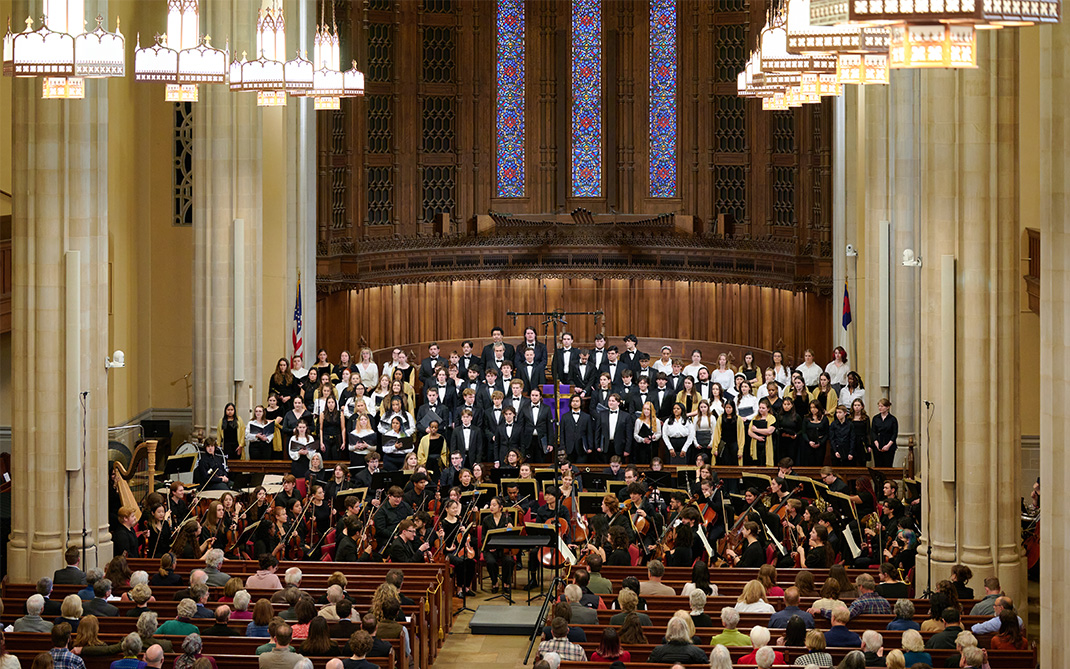5 ways virtual reality is flipping the script on screenwriting
In slam poetry competitions, a poet’s performance begins the instant they address the audience, whether with words or their eyes. It’s an unspoken “in”—the indication that they’ve entered the poet’s world and are now along for the ride.
It’s not unlike the in that occurs when one is drawn into a virtual reality (VR) experience. During a virtual reality experience, the participant typically wears a headset and is immersed in a 360-degree world simulating reality and engaging the participant (also referred to as the experiant) through sight and sound in that world. The in serves as a cue to lead the participant to where the action is happening.
In UNCSA’s School of Filmmaking, “Slam,” a virtual reality poetry experience, has taken on a life of its own.
The short film is a collaboration between graduate screenwriting student Aja Cooper and faculty member Gary Tieche. The project presented a first for both of them—writing a script for virtual reality.
Here’s some of what they learned:
1. Writing for six dimensions
A virtual reality film consists of six different planes (as opposed to the traditional two-dimensional film): front, back, right, left, up and down. One of the first things Tieche and Cooper had to consider was not just how to write for virtual reality, but what a VR script actually looks like on paper when action could potentially be happening in six different places at once.
Tieche took to the Internet and found a simple but effective template that maps the scene into four color-coded quadrants with the experiant serving as the center point. There are two additional axes for action happening above or below the experiant.
It looks something like this:

Sample page from the screenplay for "Slam" by Aja Cooper and Gary Tieche.
The colors of the text correspond to the quadrant where the action is taking place or sound is emanating from in the scene, which is important because the camera sees everything.
2. The camera sees everything
A 360-degree camera means 360-degree views, which means the crew has to get creative with the placement of lighting, sound and camera equipment. All of this starts with the screenwriter’s pen (or cursor), as what he or she writes needs to be feasible to shoot.
It also means that collaboration on a virtual reality set is critcal. Filming “Slam” brought together students from the undergraduate and graduate programs for the first time on a student-led production.

Setting up the 360-degree camera on the set of "Slam."
“This was the first collaboration between undergraduate and graduate Filmmaking students,” Cooper says. Students in the MFA Screenwriting and Creative Producing programs wrote, crewed and co-produced the film, with undergraduate students from Robert Keen's VR class. Undergraduate students shot, production designed, edited and recorded sound for the shoot. “It was really cool for all of us to link together on this project,” she adds.
3. The role of the audience has changed
From a VR screenwriter’s perspective, an audience member is no longer a passive observer taking in information from a two-dimensional screen. Instead the experiant is immersed in the world of the film.
Beyond that, the experiant is also an entity in the scene, a part of the narrative in a way they are not with traditional cinema. Their role is not only to observe, but also to help guide the action, another “dimension” screenwriters have to consider.
So, the job of screenwriters becomes twofold—telling a story that engages the experiant and accounting for what is happening in all six different planes at once.
4. Pioneers become “experts”
Tieche could be considered the School of Filmmaking’s resident “expert” on writing for virtual reality films, although it’s a title he wears lightly. The school’s recent partnership with the Oculus NextGen program means that faculty members and students with an interest in the cutting-edge technology are all becoming pioneers in their own right.
“This is the Wild West of filmmaking right now,” Tieche says. “When you are among the first people to do something new, there aren’t many others so you become an ‘expert.’ We are still discovering the limitations, what we can and cannot do with this technology.”
5. The story, as always, is key
“When Gary came to me and asked to use one of my poems for a script, I don’t think either of us thought it would take off like it has,” Cooper says. It turns out slam poetry lends itself well to the virtual reality experience. Cooper wrote and stars in “Slam,” which is currently in post-production.
“This experience gave me a look into a different world,” she adds. “Virtual reality is on the rise and it’s going to be a part of filmmaking as it grows.”
“It gives us another storytelling tool in the filmmaking repertoire,” Tieche adds.“As a writer, you want to stay relevant. In virtual reality, you still need to have a good story to tell. Virtual reality is just another way to explore that story.”
March 06, 2017





